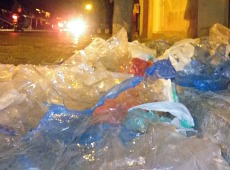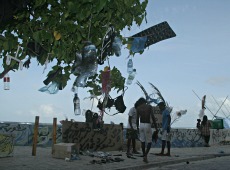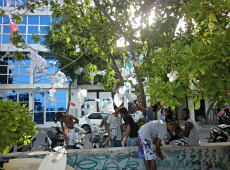The Attorney General has filed a complaint at the Supreme Court accusing the Civil Court of negligence in holding a hearing of a case filed by the state, seeking to prevent Male City Council from outsourcing the development and operation of the West Harbour Area.
Last Sunday Male City Council announced its intention to hand over the development and operation of the West Harbour Area – locally known as the ‘T-Jetty Area’ – to a local company called West Gate Assets Private Limited for a lease period of 25 years.
The project, worth US$30 million, once completed will include coffee shops, cafes, petrol sheds, shopping malls and spacious parking zones intended to resolve severe congestion in Male’ City.
Meanwhile, in its complaint filed at the Supreme Court, the Attorney General’s office claimed the Civil Court’s failure to proceed with the case meant that the government could take no action against the project.
“If that agreement proceeds as it is now, [the Attorney General’s Office] believes that will be carried out unlawfully and this office will continue to take necessary actions against the project,” read a statement from the AG’s office.
The AG further claimed that last December, when the city council announced opened bidding for the project, a case was filed at the Civil Court to invalidate the process through an injunction to stop the bidding process.
However the Attorney General’s office said the Civil Court had failed to hold any hearings into the case since May.
The statement claimed excuses for hearings being delayed included the city council’s lawyer calling in sick, the court being unable to deliver court chits and the judge being on leave.
The project
In a press conference on Sunday, West Gate’s Consultant Ismail Firag told the press that the company intended to develop the area as a phase by phase project with development of the first phase to commence on September 1.
The City Council claimed that the lease agreement had been signed by the City Council and West Gate six months ago, after the project received approval from both the Anti Corruption Commission (ACC) and the Housing Ministry.
Male City Council Member Ibrahim Sujau at the press conference said the council would try its best to make arrangements to ensure that the project was completed smoothly without disruptions.
He added that the decision to complete the project in several phases was made to ensure its smooth completion.
The councillor claimed that area was leased to West Gate for a sum of MVR 400,000 (US$ 25,940.34), approximately MVR 320,000 (US$ 20,752.27) more than the current MVR 80,000 (US$ 5,188.07) a month generated in income generated from the area by the City Council.
Opposition
The opposition Maldivian Democratic Party (MDP)-dominated Male City Council has come under heavy fire from the government over the project as both the Housing Ministry and the Attorney General have voiced against outsourcing of the harbour development.
Shortly following the announcement, Housing Minister Mohamed Muizz dismissed the claim made by the City Council that his ministry had given approval to the project.
Speaking to local newspaper Haveeru, the Minister claimed the city council had not shared anything with the ministry before handing the project over to West Gate.
Muizz further contested that city council could not take such major decisions without consulting the ministry as the West Harbour area is considered an important economic zone in Male’ City.
“It is a very important strategic location in Male’. On the other hand, development of that area is a massive project. They can’t hand over the development of the area without obtaining permission from the ministry. We even do not know how they plan to develop the area. It is an outright lie that we had given them the approval,” he said.
Housing Minister claimed the ministry had previously made a master-plan to develop the area and said that he did not believe the city council could hand the project to West Gate under a new master-plan.
Previously, the housing ministry’s bid to stop the project through the Anti Corruption Commission failed after the commission concluded that there was no corruption involved during the bidding process.
But Muizz claimed that he was determined to stop the project.
“We will look into ways to stop the project. But we have not yet decided what will be our actions. Previously, similar attempts had been made to stop other such projects. But the current legal framework itself has difficulties for such actions,” he said.




